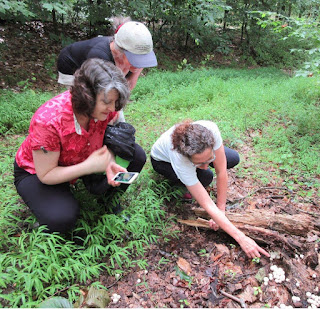Fungi are everywhere, but sometimes you don’t see them because they are small. Or they don’t look like a typical mushroom. The trick with finding fungi – well, with finding anything, really – is to learn enough about them so you know what to look for. And once you know what to look for, you begin finding fungi all around:
- Growing in the mulch beneath the tomatoes
- Popping up in the lawn after a week of rain
- In the tops of downed branches
- Growing on old logs
- Decomposing a stump in the yard
- In the breadbox and pushed to the back of the fridge
Sue: I remember the first time I saw a coral fungus. It looks just as the name suggests: like a bit of coral pushing up from the leaves. Used to finding turkey tails and mushrooms, I had no idea it was a fungus. Now I see it everywhere in the wooded area behind our garden.
 |
| Alisha checking out fungi at Highlights |
Alisha: One Saturday morning I drove to Austin to meet up with a friend that I’ve hardly seen in the last two years. I parked under a tree and hustled inside for a visit. When I returned to my car, I noticed beautiful polypore mushrooms on the tree. How did I miss them when I arrived? Probably in too much of a hurry. While researching and writing Funky Fungi, I realized there were many specimens of fungi that were there all along, but I never noticed.
Sue: When we started talking about Funky Fungi, I got a field guide (confession: I had an entire shelf of field guides but not one about mushrooms!) so I could begin to recognize the fungi growing around me. Then I discovered an amazing reference in our library system, The Book of Fungi: A Life-Size Guide to Six Hundred Species from around the World by Peter Roberts and Shelley Evans. In addition to having wonderful photos, there’s a distribution map for each fungus. It clocks in at 656 pages and weighs as much as a hefty bag of sugar (5#). I don’t own a copy, and I hate to even speculate what the delivery guy mutters every time I request it through the library system.
But here’s the thing. Paging through these books, looking at the photos, reading the descriptions … it’s made me not just more aware of the diversity of fungi, but curious about what I might find outside my door.
Alisha: Last summer my husband trimmed some branches from an oak tree. As I helped him cut them into smaller pieces, I noticed a little waving movement on one of the branches. I stooped down for a closer look. It appeared to be a piece of lichen balancing on the branch like a tight-rope walker. It wobbled from side to side and inched forward a tiny bit – an insect covered in lichens! The insect was using lichen as camouflage, maybe to protect itself from predators, or to sneak up on unsuspecting prey, or both! Before researching fungi for this book, I didn’t know that some insects cover themselves in lichens. But armed with that info, I was ready to discover one in my own backyard. Who knows what else I’ll discover!
Remember to check out our Funky Fungus Fridays over at my author Facebook page, and Alisha’s #FungiFriday posts on Twitter
Check back next month for our Happy Book Birthday celebration! Funky Fungi, 30 Activities for Exploring Molds, Mushrooms, Lichens, and More is part of the Chicago Review Press “Young Naturalists” series. You can find out more about our book at the publisher’s website. It will hit bookstore shelves next month! But if you can’t wait, you can pre-order it at your favorite local bookstore, or online at Bookshop.org


Insects using lichen as camouflage -- now that is fascinating! I can't wait to see the book. It should come soon. My library ordered six copies when I requested it!
ReplyDeleteThat's awesome, Rosi! Thank you for sharing.
ReplyDelete